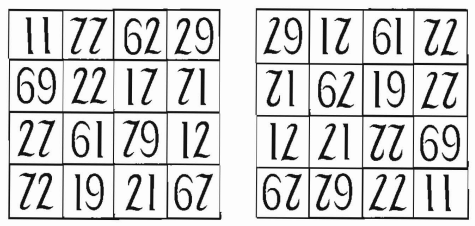REVEL EVER, EVE! O EVE, REVEL EVER!
That sentence, composed by J.A. Lindon, can reproduce itself in two ways — it’s a conventional palindrome, and it produces a natural word square:

REVEL EVER, EVE! O EVE, REVEL EVER!
That sentence, composed by J.A. Lindon, can reproduce itself in two ways — it’s a conventional palindrome, and it produces a natural word square:

Letter to the Times, Aug. 19, 1930:
Sir, In one of the loveliest gardens in the West of Scotland, opened freely on certain days to a vast public from Glasgow and that neighbourhood, courteous notices everywhere intimated that ‘Visitors are requested not to pick the flowers without leave.’ A waggish tourist went round with a paint brush, adding an ‘s’ to the word ‘leave,’ with the deplorable result that not only were flowers plucked, but whole plants — flowers, leaves, and roots — were excavated and carried off.
Yours, &c.
David Hunter-Blair

This reversible magic square comes from Henry Dudeney’s Canterbury Puzzles.
Each row, column, and diagonal in the square totals 179.
Thanks to some clever calligraphy, this remains true when the square is turned upside down.
lubberwort
n. food that makes one idle and stupid, food of no nutritive value, junk food
In 2000, Guatemalan police asked Christmas revelers not to fire pistols into the air. “Lots of people die when bullets fall on their heads,” National Civilian Police spokesman Faustino Sanchez told Reuters. He said that five to ten Guatemalans are killed or injured each Christmas by falling bullets.
Writing in a prison diary in 1943, Ho Chi Minh discovered a lesson in Chinese ideographs:
Take away the sign (man) from the sign for prison,
Add to it (probability), that makes the word (nation).
Take the head-particle from the sign for misfortune:
That gives the word (fidelity).
Add the sign for man (standing) to the sign for worry,
That gives the word (quality).
Take away the bamboo top from the sign for prison,
That gives you dragon.
People who come out of prison can build up the country,
Misfortune is a test of people’s fidelity.
Those who protest at injustice are people of true merit.
When the prison doors are opened, the real dragon will fly out.
On his release, he started the August Revolution.
epigamic
adj. attracting the opposite sex
altrigenderism
n. the state of development in which one becomes attracted to members of the opposite sex

Write the word MAYONNAISE in a circle and read it backward and you get I ANNOY AMES.
Make of that what you will.
(From Word Ways, February 1968.)

Reversing the Dutch word for kidney, NIER, gives the French word for kidney, REIN.
What’s unusual about this sentence by Harry Mathews?
Once brought into this country, partly imprudent gray barbers marry expatriate, parrying the frictions of tried friends such as Mary, the sorry crook with no work at hand, who is now without a murmur getting pastry.
It remains a sentence when you remove the Rs:
Once bought into this county, patly impudent gay babes may expatiate, paying the fictions of tied fiends such as May, the soy cook with no wok at hand, who is now without a mumu getting pasty.